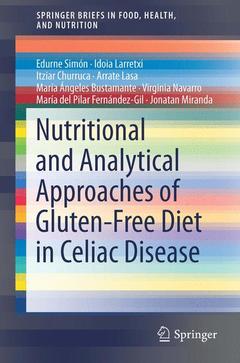Description
Nutritional and Analytical Approaches of Gluten-Free Diet in Celiac Disease, 1st ed. 2017
SpringerBriefs in Food, Health, and Nutrition Series
Language: English
Subjects for Nutritional and Analytical Approaches of Gluten-Free...:
Support: Print on demand
Description
/li>Contents
/li>Biography
/li>Comment
/li>
Provides background information on gluten, celiac disease, and other pathologies related to gluten intake, such as gluten allergy and gluten sensibility
Describes the evolution of gluten content in foods, and techniques for gluten detection in foodstuffs and additives
Analyzes the nutritional composition of gluten-free foods and the nutritional status and dietary habits of celiac people in comparison to the general population
Includes supplementary material: sn.pub/extras
These books may interest you

Gluten-free Bread Technology 189.89 €



